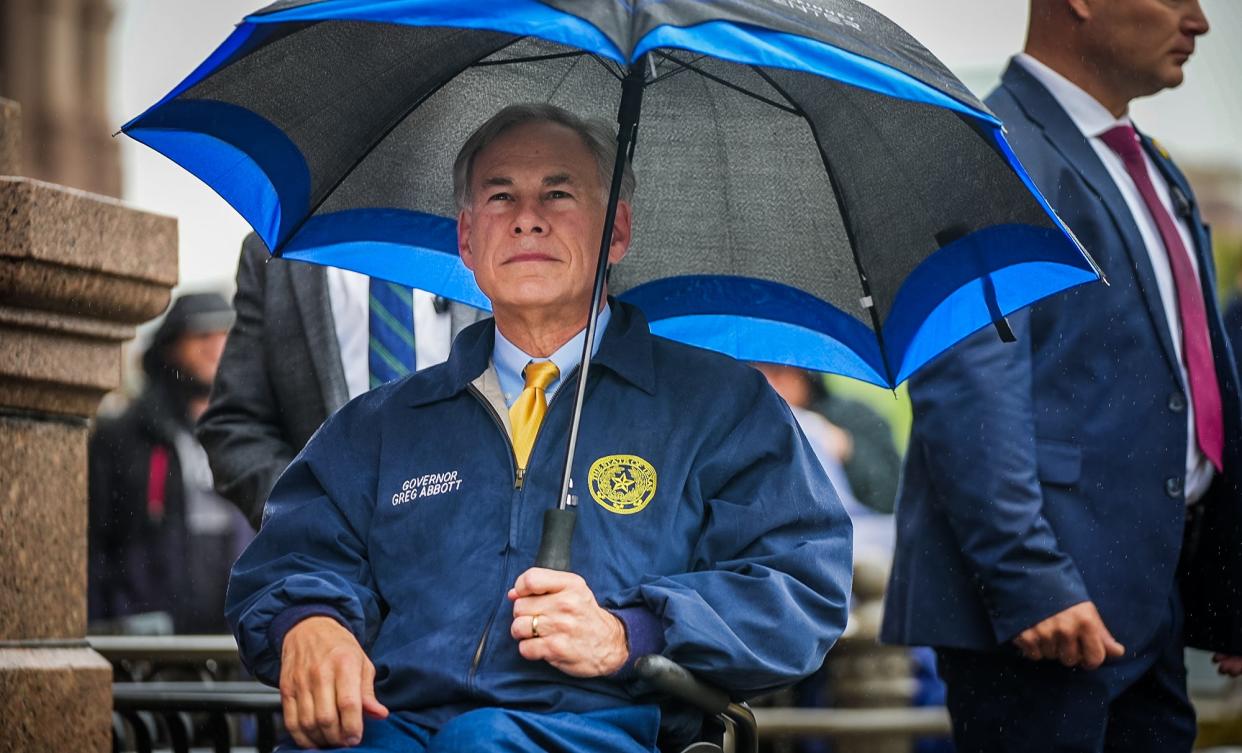Did the Texas House kill school choice? How Gov. Greg Abbott says he'll keep fighting.

- Oops!Something went wrong.Please try again later.
The ball is back in Gov. Greg Abbott’s court after the Texas House on Friday decisively cut out his signature education savings account program from a $7.6 billion education omnibus bill that would have created a controversial school choice program.
During a debate on the House floor, lawmakers sounded the death knell on the school choice plan when 21 Republicans joined Democratic members in stripping the education savings account portion from House Bill 1 by an 84-63 vote. School choice programs, also called vouchers or education savings accounts, use public money to pay for a child’s private schooling or other education-related expenses.
While school choice opponents — who worry that a voucher program would drain funds from traditional public school districts — celebrated their victory Friday night, Abbott signaled that he's not done fighting for the proposal.
“I will continue advancing school choice in the Texas Legislature and at the ballot box, and will maintain the fight for parent empowerment until all parents can choose the best education path for their child,” Abbott said. “I am in it to win it.”
For the past year, Abbott has thrown significant political weight behind school choice, touring the state to push for the program and even asking religious leaders to advocate from the pulpit for such proposals.
On separate occasions, Abbott has warned lawmakers that he would call them back to Austin for successive special sessions if they didn’t deliver school choice, and he has threatened Republicans who vote against his signature issue, saying that he would support their opponents in GOP primary elections.
Abbott offered little clarity Friday evening on what his next move will be.
HB 1 proposes to create an education savings account program to give each eligible child $10,500 annually to help pay for private schooling. The program would prioritize low-income and special education students. The bill would also have pumped billions into traditional school districts, raising per-student spending and giving teacher pay raises.
After Democrats and the 21 Republicans stripped education savings accounts out of HB 1, the House referred the bill back to the House Education Committee, where it could either languish for the rest of this special session or be revised and sent back to the House for further consideration.
When asked Friday if he planned to again take up HB 1 in the committee, Rep. Brad Buckley, who chairs the committee and authored the bill, said no.
"I think the vote today was very, very clear," said Buckley, R-Killeen.
House Democrats celebrated the defeat of HB 1 on Friday and insisted they’d continue to oppose school vouchers, despite any pressure from Abbott.
“Whether it’s the fourth special session or the 40th session, we will not change our position,” said Rep. Trey Martinez Fischer, chairman of the House Democratic Caucus.
Democrats still want to talk about investing more money into public schools but not if it involves a voucher program, he said.
“We will not, we will not, we will not do it with our arms twisted,” Martinez Fischer said.
Many districts, including Austin public schools, passed a deficit budget this year with hopes that the Legislature would give them more funding in a special session. Most superintendents, however, are opposed to education savings accounts.
More: As districts, parents seek better education outcomes, Texas lawmakers weigh school choice
The school choice issue has splintered the state Republican Party, and passions rose hot Friday during the HB 1 debates, which were mostly between GOP members.
Rep. John Raney, R-College Station, offered the amendment that stripped education savings accounts out of HB 1 over concerns it could bankrupt Texas.
“I believe in my heart that using taxpayer dollars to fund an entitlement program is not conservative and it's bad public policy,” Raney said.
The public school funding and a school choice program would grow 502% over five years, from $1.85 billion next year to $11.1 billion in 2028, according to the bill’s fiscal analysis.
Lt. Gov. Dan Patrick, who leads the Senate, said he was “stunned” that 21 Republicans voted against school choice.
“These members apparently think their own view is more important than the views of their voters, of which over 80% of Republicans support school choice, along with the majority of Independents, and many Democrats,” Patrick said in a statement Friday.
The 21 Republicans who voted to strip education savings accounts from HB 1
Rep. Steve Allison, San Antonio
Rep. Ernest Bailes, Shepherd
Rep. Keith Bell, Forney
Rep. DeWayne Burns, Cleburne
Rep. Travis Clardy, Nacogdoches
Rep. Drew Darby, San Angelo
Rep. Jay Dean, Longview
Rep. Charlie Geren, Fort Worth
Rep. Justin Holland, Rockwall
Rep. Kyle Kacal, College Station
Rep. Ken King, Canadian
Rep. John Kuempel, Seguin
Rep. Stan Lambert, Abilene
Rep. Andrew Murr, Junction
Rep. Four Price, Amarillo
Rep. John Raney, College Station
Rep. Glenn Rogers, Graford
Rep. Hugh Shine, Temple
Rep. Reggie Smith, Sherman
Rep. Ed Thompson, Pearland
Rep. Gary VanDeaver, New Boston
This article originally appeared on Austin American-Statesman: Texas Legislature: House rejects school choice; Abbott keeps fighting

